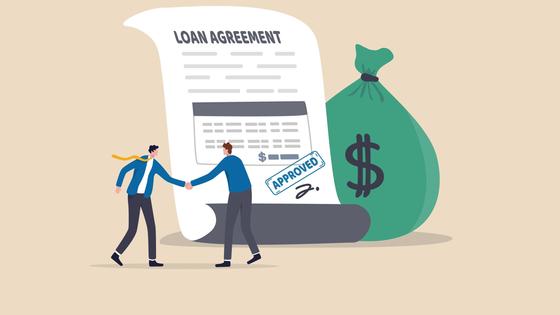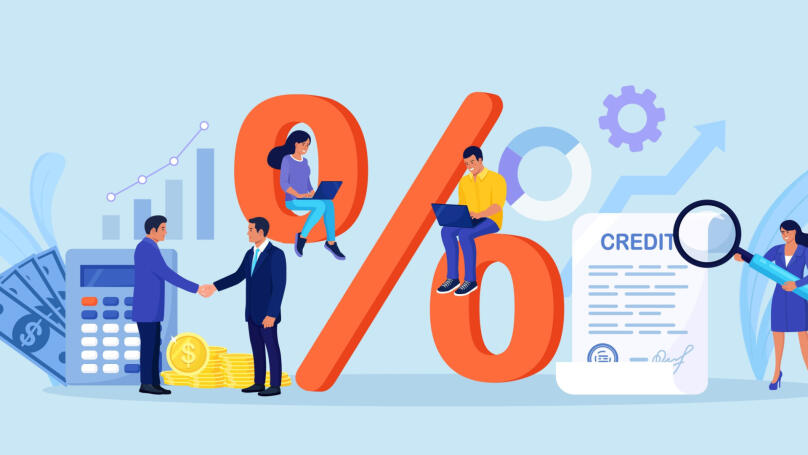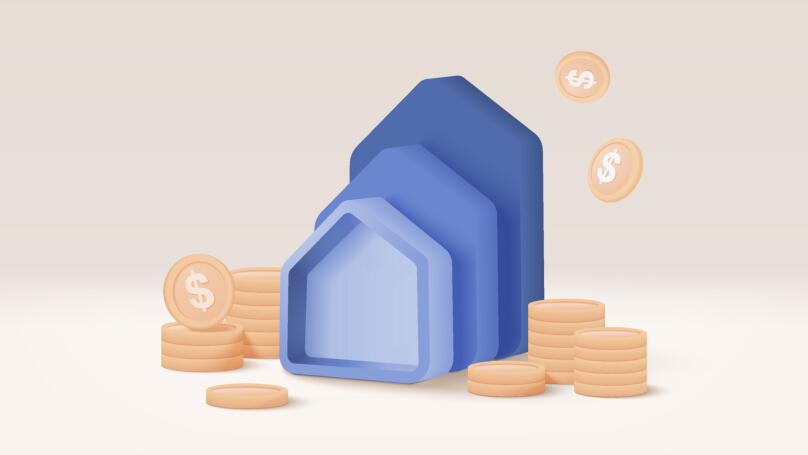Is it worth taking out a loan? Tips for a sensible loan
Sooner or later, everyone may find themselves in a situation where they can’t afford a big purchase right here and now.

A serious financial investment is usually required to start a business or launch a start-up company. According to most people, a loan is one of the fastest options for obtaining money. But while some see it as a convenient and efficient financial tool, others fear getting trapped in debt and shun banks like fire. So, who’s right? Is it worth getting involved in lending, and if so, what are the rules to follow?
What types of Loans are there?

First, off the bat, you must know the exact purpose of the loan and why you wish to borrow the money. Then, the type of loan will determine how much money you can borrow and under what conditions. There are two main types of credit: directed and unspecified. Let’s look at the differences between them.
A purpose loan gets taken out for a specific purpose; that is, the borrower must spend the money for a specific, stated purpose. The bank controls this process and checks how the loan got spent. Of course, it can happen that the bank will not be interested in what you have done with the money if you repay the debt on time. However, it is better to use the money honestly. Among the target loans are the following:
-
A Mortgage Loan and a Car Loan
A mortgage is a real estate purchase — a flat, house, or plot of land. It is the property that is purchased that is subsequently pledged as collateral for such a loan. That means that if the borrower has not repaid the money to the bank, the property is owned by both the borrower and the bank. Of course, the client can live in the flat or house, but the lender has the right to take the property away in case of non-payment. Mortgages are characterized by long loan terms and a relatively low-interest rate on mortgage payments. This type of loan is considered the most advantageous because often, the property’s value not only does not fall but also increases. The same principle is applied to car loans: the client takes out a loan and uses the proceeds to purchase a car. As a result, the vehicle becomes a pledge for a bank until full repayment of debt. Nevertheless, Lectera’s experts warn it’s advisable to take out a car loan only if your career suffers without it, if you get a big discount, or if you foresee a price hike on the car market in the near future.
-
An Education Loan.
In this case, the money the bank allocates is designed to pay for your college. The amount of money given is usually determined by the fee schedule of the particular college. The rules on repayment of the loan differ as well. For example, only the interest is paid during the studies, and the principal will get repaid after the graduate finds a job. However, some banks set a minimum age limit for borrowers, for example, twenty-one years old. In this case, the parents of the future student can take out an education loan.
-
A Loan for Purchases and Services
These are the most common loans, also called consumer loans, for example, for household appliances, repairs, medical treatment, holidays, etc. The bank lends small amounts of money and does not require any collateral.
-
Refinancing
A refinance is when you obtain a new loan from another bank on more favorable conditions to pay off the previous one. Essentially, the borrower can get a new, lower rate to pay less interest.
These are all variations of a particular-purpose loan, where the bank knows your financial intentions and prospects in advance. But there are also non-targeted loans. For example, it means that the borrower takes a certain amount of money from the bank and spends it as they see fit. In this case, the lender receives no collateral, and the risks are much greater for the bank. That is why the bank insures itself with higher interest on such loans.
Thus, the terms and conditions of a directed loan are regarded as more favorable than taking out a loan with no purpose. A loan is also more appropriate if you want to make a large and expensive purchase. On the other hand, a microloan is a small loan that is disbursed without much scrutiny of your creditworthiness. Therefore, it risks being a drain on your finances. That is because even though it’s easy to get a microloan, the interest rate on such terms is very high, and your debt will grow by leaps and bounds.
Simply put, the upshot is this: if you want to buy something, like a household appliance, it’s far cheaper and easier to just save up for the same multicooker or TV rather than take out a loan and end up overpaying for the purchase significantly. It is also best to save if you want to take a holiday and go to the seaside or if you want to renovate your home. On the other hand, loans are only recommended if you’re sure that your goal will pay off, it will take too long to save on your own, but you’ll be able to repay on a due date. You can assess your financial possibilities and learn how to be financially literate by attending the course ‘Reducing Financial Risks. Efficient Security Techniques.”
The Advantages and Disadvantages of Credit

Of course, there is no simple answer to the question - should you take the credit? Each person evaluates their financial possibilities and prospects. However, it is important to remember that there are always risks, especially when dealing with the banking sector. The most serious risks in lending are interest rate increases, currency fluctuations, a crisis in the national economy, or your personal financial crisis (if you lose your job, for example). Additionally, credit has disadvantages such as:
-
You are paying not only the principal amount of the loan but also the accrued interest.
-
You will be financially and physically dependent on the bank for a certain period.
-
There is also the possibility of losing the purchased goods or real estate and other property in case of financial problems.
Amid so many risks and disadvantages, loans have just one advantage - the ability to make any major purchase that you would not be able to make without raising additional funds. Loans can also help you grow or expand your business, but you should always consider the economic situation of your company and the country. Taking out a loan is most beneficial and effective in a stable economy. That is because the risk of losing your income source and suffering a significant financial loss increases significantly.
Tips for Smart Lending from Lectera’s Financial Experts

If you decide to take such a big step as taking out a loan, trying to make the lending as profitable and safe as possible is essential. There are a few tips to help you do just that.
Tip 1: Take your time and think about your options.
These decisions, like getting a loan, aren’t made in the heat of the moment or on the fly. First, answer the question honestly: “Is my financial situation really worth taking out a loan, and does my goal justify all the risks? Why do I need it at all? beyond the obvious?” You must weigh up all the arguments and analyze the situation, laying it out. In this case, brainstorming questions that are best answered by writing them down in a notebook helps:
-
How much money do I need?
-
Will I be able to pay it back within a certain period?
-
What are the risks that my goal will not pay off?
-
What benefits will I get if it works out?
-
How much money do I have at the moment?
-
Are there risks of me getting fired or having my salary cut?
-
Do I have additional stable sources of income?
Making a two-column list of the pros and cons of credit is also advisable. It’s a proven methodology will help you understand your situation thoroughly and make the right decision for you. It will also help you determine if your credit score covers all the risks of borrowing.
Tip 2. Assess your Financial Situation.
If you already have credit, review and recollect how much you borrowed in the past and what interest rate is reasonable. Calculate how much of your monthly income goes towards repaying your existing loan. Remember that payments on all debts should not exceed thirty to forty percent of your monthly income! If that is how much your payments currently amount to, the new loan will take so much of your income that it will not leave you with even minimal financial means to live comfortably.
However, if you firmly believe that a loan, on the contrary, will improve your quality of life, then first reconsider your current expenses. You might be able to reduce them without affecting your quality of life and still get by without a loan. One of Lectera’s most popular courses is “Financial Awareness: Basic Tools of Capital Increase.” During the course, you will receive valuable instructions and versatile methods on optimizing your expenses, which can come in handy if you have decided on a new loan!
Tip 3. Don’t Contact Microfinance Institutions to Pay Off previous Debts!
Accumulating debts is the most common mistake. However, you should not take out a new loan to pay off one debt. Yes, there is a type of credit that we wrote about above - refinancing. It involves comparing loan offers from different financial institutions, transferring the client to a new bank, and better repayment terms. But micro-loans do not belong to this because the conditions for obtaining a loan will not improve, and your financial burden will increase significantly. Quite simply, if you take out a microloan, your debts will snowball, and you will pay far more than the bank.
Lectera’s Online Courses by topic
Tip 4. Find a Loan that Suits You and Read the Contract Carefully
When choosing a loan, compare and analyze the offers from different banks. You pay particular attention to things like:
-
The amount of the overpayment
-
The payment schedule; - penalties and fines.
-
Penalties and fines.
-
Early repayment conditions.
Additionally, a low rate does not guarantee that overpayments will be minimal. When you take out a loan, you must find out what is behind the rate shown in the terms and conditions in the written agreement. For example, this rate may be valid only if you buy an insurance policy. Or the bank has the right to charge borrowers fees for processing or repaying the loan prematurely. You will have to pay to determine the total cost of the loan. This amount should include the introductory interest rate, the insurance fee, commissions, and additional fees for servicing the account.
Also, carefully consider the monthly payment and the term of the loan. Of course, you want to eliminate any debt as soon as possible. Moreover, the shorter the loan duration, the lower the overpayment. However, in this case, the number of monthly payments increases. Try to find a balance between these criteria.
Tip 5. Pay on Time and Adhere to all Terms of the Agreement
To avoid the negative consequences of a loan, you should study the contract carefully before signing it and then perform all your obligations as a borrower. For example, it would be best to be punctual when making payments. Payment days are usually fixed, so you should ensure you have the amount you need in your account when the bank deducts it. Additionally, your contract may state that if you make several payments late, the bank has the right to demand that you pay back the entire loan.
So, taking out a loan can either play into your hands or put all your hard work to rest. The main thing is not to let yourself get fooled by inflated expectations! So, the contract should clearly state all the essential information, such as repayment terms, total costs, possible penalties, and fees. It is vital to read it carefully and assess your financial prospects adequately. Take your time, and do not rush with such a decision. Indeed, before making a final decision, the best option is to take Lectera’s “Money Education. Self-confidence and Making Money” course, where you will learn effective saving techniques and how to achieve any financial goals.
Share this with your friends via:
Latest News

A significant stage in the development of the alternative education system has begun in West Northamptonshire in the UK: the County Council is actively calling on parents, guardians, and trustees to participate in shaping the future of this key area.

Outwoods Primary School in Atherstone, Warwickshire, having experienced deep sadness after the loss of their famous cat, Silla, has found solace in a new pet – a Maine Coon named Aloysius O’Hara.

In modern universities, artificial intelligence, and in particular ChatGPT, is rapidly transforming from a controversial tool into a full-fledged student assistant.

An innovative educational project is gaining momentum in UK primary schools, aiming to change attitudes towards video games.

The Massachusetts Institute of Technology (MIT) presents MIT Learn – a revolutionary online platform that opens a “new front door” to access university knowledge and resources.












 “I’m Here for the Long Haul”: When Loyalty to a Company Becomes Toxic
“I’m Here for the Long Haul”: When Loyalty to a Company Becomes Toxic
 Freelancing, Remote Work, Office Jobs, or Consulting: How to Choose the Work Format That’s Right for You
Freelancing, Remote Work, Office Jobs, or Consulting: How to Choose the Work Format That’s Right for You
 Test: How Prone Are You to Abusive Behavior as a Manager?
Test: How Prone Are You to Abusive Behavior as a Manager?
 Test. What superpower would you possess if you were a superhero?
Test. What superpower would you possess if you were a superhero?
 Test. What Should You Let Go of Before Winter Ends?
Test. What Should You Let Go of Before Winter Ends?
 Test. Which Ritual Should You Start Practicing This Winter?
Test. Which Ritual Should You Start Practicing This Winter?
